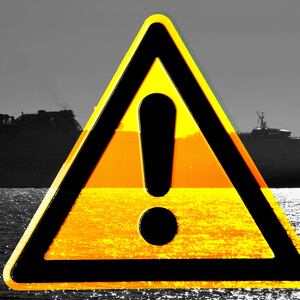Leonard Lindsay thought his husband was going to die.
Forty years ago, in 1980, he met Carl Zehner at a YMCA in Knoxville, Tennessee. They fell in love quickly. And though they were later able to legally marry—on the steps of a San Francisco courthouse, no less—they always considered that first meeting their anniversary.
So on March 7, 2020, even as the coronavirus had already begun turning cruise ships into disaster zones in Japan and Australia, the pair boarded the MS Zandaam in Buenos Aires, Argentina, hoping for the best.
From their home in Nashville, 70-year-old Lindsay told The Daily Beast on Friday that things went downhill fast.
“We were not sure if we would make it home alive,” he said, as the ship became overrun with COVID-19, ports began denying the cruise entry, and his husband got sick.
Lindsay described how, as a retired nurse, he tried to tend to his husband, who was five years his senior. But at some point, he said, “Carl just wasn’t getting any better.”
Eventually, 75-year-old Zehner was lifted onto a helicopter and flown to a hospital in Orlando, where he was put on a ventilator for 27 days, Lindsay recalled. Zehner spent 70 days in the hospital, losing more than 30 pounds, according to the couple. They spoke on the phone and in Facetime calls until they were allowed to meet in person.
“One time, when he still couldn’t speak, he wrote on a whiteboard, ‘I want to die,’” Lindsay told The Daily Beast.
In June, the couple filed a $5-million federal class-action lawsuit in the Western District of Washington at Seattle, claiming that “as a direct and proximate result” of negligence and gross negligence by Holland America and its parent company, Carnival, Zehner “was exposed to and suffered from COVID-19,” and that he “continues to suffer from the effects of this illness” many months later.
In the course of the lawsuit, documents released via federal open records laws and obtained by The Daily Beast have revealed communications between the Centers for Disease Control and Prevention (CDC) and Carnival, showing how the cruise handled the infections on board. The documents paint a picture of confusion and panic as the scale of the outbreak came into focus, and how health officials and industry players butted heads over an emerging disaster that would soon wreak unprecedented havoc on the mainland United States.

The communiques also appear to show that the ship waited days to impose a quarantine after symptoms of COVID-19 were first reported onboard, that they wanted to send asymptomatic passengers home on commercial flights despite repeated warnings from the CDC on the subject, and that there was not enough medical equipment on board—specifically oxygen—to handle an outbreak of a contagious respiratory virus with a majority of elderly passengers.
The couple’s attorney, Kenny Byrd, said the 178 pages of documents, which have not previously been reported, display examples of “outrageous misconduct.” Most remarkably, they indicate, in what appear to be notes from a call with Dr. Grant Tarling, Chief Medical Officer for Carnival, taken by the CDC’s Dr. Cindy Friedman, that there were reports of symptoms among both passengers and crew members as early as March 18—and that it wasn’t until a surge on March 21 that the ship decided to implement a quarantine, beginning the next day.
“On 3/ 18 started getting reports of ILI among pax and crew,” the notes by Friedman read. “On 3/22 All guests quarantined cabins and room svc - activities cancelled… Not many spare cabins so they are cohorting crew to sick cabins and well cabins.”
According to Lawrence Gostin, an expert on public health law at Georgetown University, “Waiting several days before initiating a quarantine can be disastrous. During the lag time, there is likely to be cascading spread.”
In response to questions about the revelations in the documents, Erik Elvejord, Director of Public Relations from Holland America, told The Daily Beast, “Holland America Line appreciates the difficulties faced by so many as a result of the COVID-19 pandemic. Our response throughout this process has been focused on the well-being of our guests and crew within the parameters dictated to us by the government agencies involved and the evolving medical understanding of this illness. We do not comment on any pending litigation.”
Tarling, the medical officer, and Carnival, Holland’s parent company, did not respond to a request for comment.
The World Health Organization declared COVID-19 a global health emergency on Jan. 30, upgrading it to a “global pandemic” on March 11—a move some criticized at the time for coming later than it should have.
Cruise ships in particular had already emerged as hot spots.
“Outbreaks of any type are a risk on cruises because a large number of people spend time in close contact with travelers and crew from many locations around the globe,” Dr. Jennifer Horney, founding director and professor in the University of Delaware’s epidemiology program, told The Daily Beast.
Still, the couple claimed in their lawsuit that before they boarded the ship in Buenos Aires, Holland America touted the company’s “deep partnerships with global health experts” and “enhanced screening, prevention and control procedures.”
The lawsuit also cites the case of the Diamond Princess cruise, operated by Carnival, which began in February and was at one point the largest COVID-19 outbreak outside of China, infecting 712 people and killing nine. The lawsuit stated that 1,500 positive COVID-19 infections and almost 40 deaths were ultimately linked to cruises operated by Carnival or its subsidiaries.
The CDC has since said that more than 250 people “reported illness consistent with COVID-19” on the Zaandam and its sister cruise, the Rotterdam, which took on some of the passengers of the Zaandam after the outbreak began. But Holland America has never revealed how many people were tested for the disease.
“We were told the cruise would be subject to pre-boarding health reporting and enhanced screening at check-in,” Lindsay told The Daily Beast. “We have been on dozens of cruises together, and they operated just like all the prior ones—except this time they were aware a pandemic was raging on their other ships.”
The day they boarded, however, their temperatures were not checked, the lawsuit claims. As the outbreak worsened, the cruise stopped in Montevideo, Uruguay, and then the Falkland Islands. It canceled its itinerary and turned “north” on March 15 when many South American ports closed to cruise ship traffic, Business Insider reported.
“We’re now on a mystery cruise because we have no idea where we're going,” an American passenger told the publication at the time.

About a week later, the captain announced the death of “four older Zandaam guests,” according to an audio recording provided to Business Insider. Two of those guests were later confirmed to have COVID-19.
The documents obtained by FOIA also include mention—in Friedman’s notes—of one 75-year-old citizen of the United Kingdom who was intubated on board, which apparently concerned Tarling, the Carnival medical officer, because the ship had only 11 oxygen cylinders—and that patient was “using up much of the 02 supply.”
As countries denied the ship entry and passengers got sicker, the correspondence took on a more ominous tone.
In an April 1 email from Friedman to Chief Maritime Officer of Carnival Corp, William Burke, she reiterated that the ship should send “symptomatic patients, who are medically able to travel, back to their homes as soon as possible by private transport.”
But, Friedman said, “They should not travel with well passengers, nor by commercial conveyance.”
Burke and Friedman went back and forth several times about the company’s plan to send people home on commercial flights, with Friedman writing that “CDC recommends that all passengers not travel commercially.”
Wrote Burke, “Doctor, the guidance we have says CDC recommends that only for symptomatic people. You were clear on the call the other day that commercial travel is fine for well people, face masks as a precaution.”
In any case, by April 3, John Haeflinger, Senior Vice President of Maritime Policy and Analysis for Carnival, wrote that the company had pulled passengers slated to travel on commercial planes and were working on “alternative repatriation options.”
Friedman, Burke, and Haeflinger did not respond to requests for comment from The Daily Beast on Friday.
If the communications in the documents reflected a concerted desire to send home asymptomatic passengers on commercial flights without first testing them for the virus, Gostin said, it would be “scandalous and utterly irresponsible.”
<p><strong><em>Do you know something we should about the coronavirus, or how your government, school, or business is responding to it? Email Olivia.Messer@TheDailyBeast.com or securely at olivia.messer@protonmail.com from a non-work device.</strong></em></p>
That said, experts know much more today than they did in March about the reality of asymptomatic transmission, and how the virus spreads more generally.
As Dr. Horney put it, “one of the major challenges with COVID since the beginning has been asymptomatic transmission,” especially in the days when diagnostic kits were much more limited, as they were in March.
“Now that testing is widely available, asymptomatic cases can more easily be identified,” said Horney. “No one who is positive or a close contact should be traveling.”
While Carnival has so far declined to publicly comment on the specifics of the lawsuit, in a complex, 34-page motion to dismiss the case filed in October, the company argued, “In these extremely uncertain and unprecedented circumstances—at the very outset of a pandemic that still remains out of control—defendants’ conduct was not ‘outrageous’ as a matter of law.”
As for future cruises? In October, the CDC lifted its “no sail” order on American cruise ships and set out a stringent framework for how cruising could begin again, and cruise lines will only be allowed to start passenger operations once they meet all requirements and are granted a conditional COVID-19 safety certificate issued by the agency itself. Most cruise lines said in the fall that they would be using the rest of the year to adapt to those orders and planned to open to passengers in 2021.
Suffice it to say that Lindsay and Zehner will not be among them.
Now, on Saturday mornings in Nashville, the pair eat eggs and toast for breakfast and play bridge for a few hours. Then Lindsay takes a nap, with their pet bird resting on his leg, while Zehner “putzes around with his phone.”
When possible, they try to forget the cruise, which Lindsay calls “a nightmare,” one still festering even as the coronavirus vaccine begins to roll out and Americans long for a return to normal.
“It’s not one you want to have,” he added.
—With reporting by Ana Lucía Murillo








